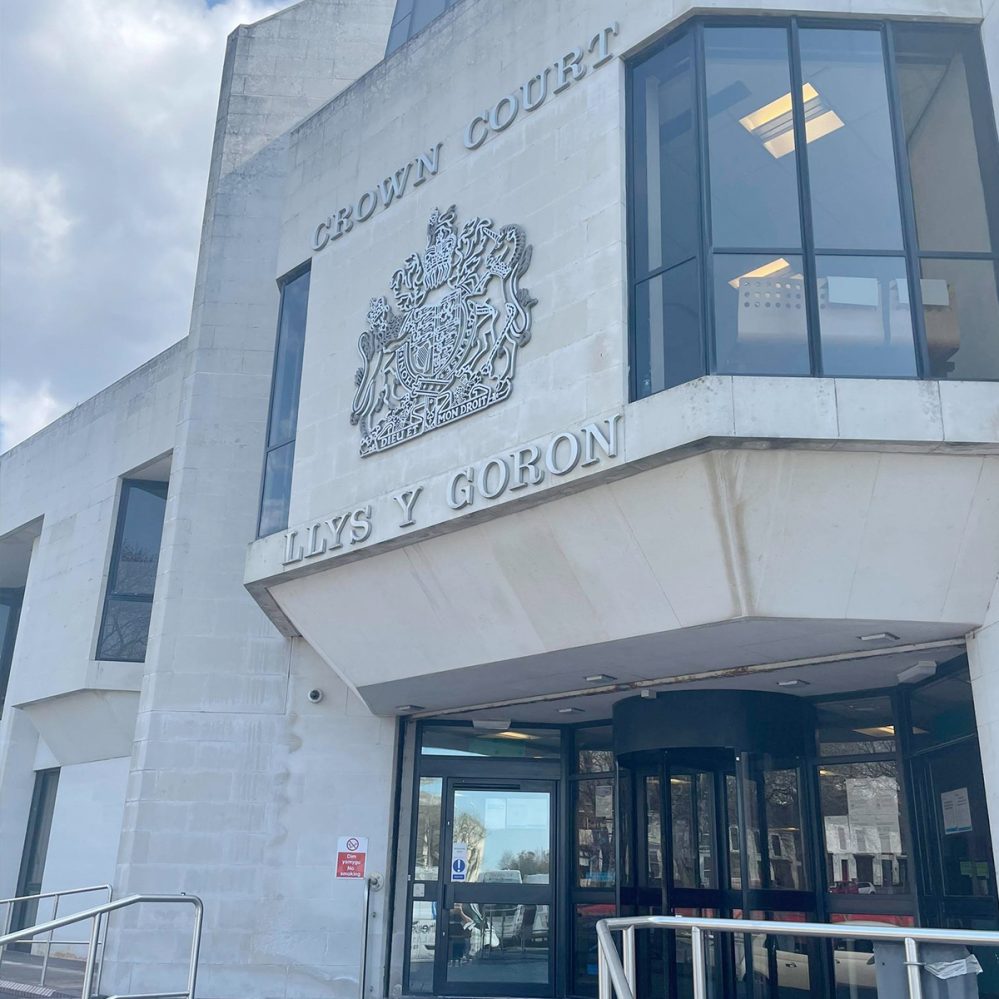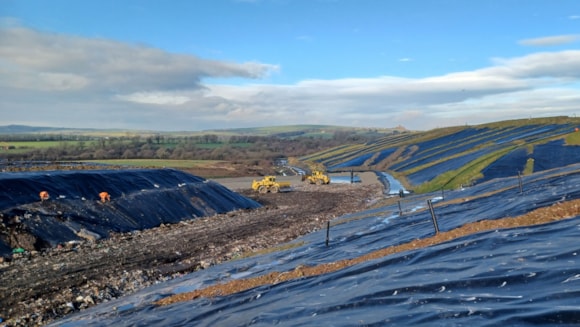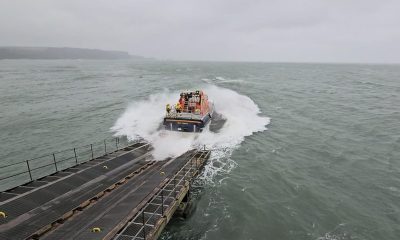News
Will Lower Town be abandoned to the sea?


Lower Town Fishguard
CHAIRED by AM Paul Davies, residents of Fishguard and Goodwick attended a meeting to address representatives from the Pembrokeshire County Council and National Resources Wales, about the flooding issue which has long plagued Fishguard Lower Town.
The meeting was scheduled to discuss a Flood Investigation Report brought out by PCC on the topic of the serious flooding which occurred in 2014.
In 2014 the tidal surge saw water not only come from the sea to flood properties, but also up through drainage systems beneath houses, which proved an impossible force to tackle.
Starting off with Richard Wicks, Flood risk analysis team leader for the NRW speaking about the responsibilities NRW has and then going onto PCC’s Darren Thomas who explained the councils responsibility for the roads, highways and coastal protection constructions. Also attending was PCC’s Emyr Williams one of the coastal engineers and Pauline Louchart the emergency planning officer for the council.
What do the people of Lower Town think of the report?
In Mayor Richard Grosvenor’s absence, town Cllr Alex Allison spoke on behalf of the town and said: “One of the things I noticed in the report, I think on behalf of both agencies, it is a total abligation of their responsibilities, and that they’re passing this responsibility directly onto the local residents.
“The other thing that concerns me about the report is that you keep talking about projected frequencies, we know that in the last 10-15 years your projected frequencies have been blown right into the air.”
Also criticising the councils emergency efforts Cllr Allison said: “I also have to criticise the county council directly, in the actions they take when there is flooding.”
He continued: “To turn around and tell residents that if they want sand bags, they will have to buy them for themselves is again, a total abligation of their responsibilities.”
How does the report help the residents of Lower Town?
Getting down to the main issue the residents have with the report he also brought up the fact that, the report does not shed any light on future plans to tackle the flooding issue.
Alex Allison also brought up something mentioned in the report, which said that the cost of the properties has to outweigh that of the works being completed.
Following on from this he questioned how the works at Newgale were financially justified, where there is only ‘One pub and a field’ and not to save ‘125 houses in a historic village.’
He said: “I know a lot of people in the village feel the same way, that we are going to be abandoned in the long term.
“All we ask for is for you to tell us what plans you’ve got to stop it happening.”
Paul Davies then once again took the floor to highlight they key issues and possible ways to tackle them, which were brought up in the meeting directly following the 2014 flood crisis.
He also mentioned about the second flood which occurred just a month after the main issue which sparked the initiation of the report happened.
Some of the discussed flood defences included a “flood gate, and improvement to the old quay”, however he said: “No immediate solution was found, thus creating the need for the report.”
What do the locals think of the report?
Darren Thomas briefly explained the report: “We looked into what happened with the flooding, its causes, a summary of the incident, the responsibilities of those involved, and the conclusions and recommendations.”
“The report also includes technical details about the flooding for how our findings came about.”
He then welcomed questions from the attending audience. One man stepped up and began picking apart the report, he said: “In the conclusions and recommendations section you reference the operatives, who you say are trained, but it seems they need some guidance on where to place sand bags.”
He continued to explain an example where those placing sand bags had used ‘no common sense’ when placing them in non-strategic way.
Questioning the qualifications of those who wrote the report he also spoke about one possible flood defence strategy listed, and he himself being an engineer with over 50-years experience explained how the solution would make the flooding worse.
He then also stated that it was obvious that no public consultation had taken place when writing the report, because it was written from an unfamiliar perspective.
One lady asked why the report had taken two years to write, and questioned a point in the report which stated the sewage systems beneath the homes were deemed satisfactory following the January 2014 flooding.
She then went on to quote the report which said that no immediate action was needed in order to tackle the flooding issue, which she followed up by asking the rhetorical question: “What about the flooding which then occurred just one month on from that flood?”
Darren Thomas addressed the issue of the time it took to release the report and said: “This hasn’t just been sat on a desk waiting to be issued, it has gone through a process of consultation with stake holders and being drafted.”
Henry an attendee of the meeting began by stating he could match the engineering qualifications of those talking about the report and continued: “They built a refinery from scratch to produce oil in 18 months and you’ve taken two years to write a report which should have taken four at most.”
What is going to be done for the future?
Henry then proposed an idea and finishing with the question: “Are you going to do anything about the flooding or not?”
Bruce, another local, then picked more problems and issues with the plan when he was interrupted by Darren who said: “We’ve come along tonight to try and constructively discuss the issue, it is not constructive to keep just slagging off the report.
“We are here to go through the report and its findings.”
Richard Wicks added: “We do want to stop the flooding in Lower Town Fishguard and on the Abergwaun.”
He continued: “The first stage is to map where we actually are with the flooding, which we are doing, so please don’t think we don’t consider your small town here worth looking at.
Bringing up a few of the suggestions and problems with the proposed plans, Richard said about how Lower Town doesn’t just face tidal flooding but fluvial flooding from the river, he noted: “The last thing you want from us as engineers is to stop one type of flooding and leave you exposed to the other.”
Talking about more of the suggested solutions, he said that the cost would be very high for any considerable works and went on to explain the priority ranking system in place, which they advise the Welsh Government on.
Richard said: “Fishguard is about 400 on the list. Cardiff with it’s high population is top, as they are at risk of flooding with rising tide levels.
“Money would be much more wisely spent on areas like this with a high population. In time we will look at flood defences for Lower Town.”
Deputy Mayor, Mike Mayberry then spoke about Fishguard being so low down the list, and said about how places like Newgale where there are no residents effected have already had work started.
Darren went onto say that the work at Newgale isn’t about protecting houses or residents but is ‘managerial alignment’ after a ‘vulnerability survey’ showed the trunk road had only 10 years left before it was lost to the sea.
What was the final conclusion of the meeting?
More discussion about strategies to solve the problem, including short term suggestions about stopping traffic took place which Emyr said would be ‘extremely difficult to police’. The meeting continued to heat up and a local man left the meeting through frustration, of not hearing any actual solutions from the report which took two years to complete.
Highlighting that the meeting had started to snow ball and cross topics set out for discussion, Paul Davies pulled the meeting back and asked the panel to answer the question: “What solutions can you bring forward to start alleviating the issues?
“Because so far I am not hearing any.”
Richard from the NRW said that before work could be started, time has been taken to map the area and it’s specific issues, but further studies would need to take place to more studies and surveys would need to be completed.
He expressed that because it is a small harbour there are limits to what can be done, and lots of this they cannot do as it would spoil the scenery.
Paul Davies asked him to confirm: “Are you saying that further studies will need to be done?”
To which Richard replied: “Studies will be done, but I can’t promise you when they will be done, as any public funded body, we have to do things in a prioritised way.
“We have done what we can for Lower Town Fishguard.” He continued: “at the moment we have done what we can for residents in the short term.”
A local woman stood up and said: “So basically what you are saying is that you will not be doing anything!”
He responded: “I didn’t say that.” another man jumped in and said: “If it’s already taken two years to get this report, how many more years will it take for the next?”
Richard responded: “It really depends on availability of funds.”
Asked if they will be consulting the locals in any further reports, he replied by saying that they would. At which point several locals raised their voices and stated that is was not done with the current report.
The meeting closed with Richard saying that in the short term nothing will be done for Lower Town, and after being questioned as to how long ‘the short term’ was, he responded by saying it all depends on fund.
Richard then spoke about some solutions and concluded by saying: “If the cost of the measures are not much less than the damages that it is stopping, the works will not be allowed to go ahead.”
A local man asked: “I’ve got a simple question, give us a clue when it is going to start?”
Richard replied: “It is not in the short term, that is all I can say. It is all a question of resources and priority.”
Community
St David’s Day parade brings colour and celebration to Haverfordwest

HAVERFORDWEST town centre was a hive of activity today (Friday, Feb 27) as hundreds of children from schools across Pembrokeshire took part in a special St David’s Day celebration.
The popular parade, organised by the Pembrokeshire Language Forum, returned to the county town once again, with smiles all round from participants and spectators who lined the streets to watch.
Children paraded down High Street, through Bridge Street and along Quay Street, led by Samba Doc, before gathering at Picton Playing Fields for songs and dancing during an open-air jamboree with entertainer Tomos Tanllyd.
Pembrokeshire County Council Leader Cllr Jon Harvey said: “St David’s Day is always a special occasion in Pembrokeshire, and it was wonderful to see so many young people coming together to celebrate our language, culture and national identity.”
Cabinet Member for Education and the Welsh Language, Cllr Guy Woodham added: “The annual St David’s Day parade is a shining example of what schools in Pembrokeshire do to celebrate the Welsh language and culture, and they are certainly enthusiastic about it.”
Council Vice Chairman and Champion for the Welsh Language and Children and Young People, Cllr Delme Harries said: “It was fantastic to see such enthusiasm from pupils across the county, proudly celebrating St David’s Day.”
Local member Cllr Tom Tudor also praised the event, adding: “It really was a great celebration of St David’s Day and a highlight for Haverfordwest.”
Welsh Language Development Officer Catrin Phillips said the event continues to grow each year.
She said: “The St David’s Day parade, organised by the Pembrokeshire Language Forum, is always a highlight of the year and it’s wonderful to bring schools together to celebrate Welsh language and culture in such a joyful way.
“It has been especially encouraging to see new schools joining us this year, helping the event continue to grow.”
Crime
Axe gang stormed home as couple feared they would be killed, court hears

Five masked men smashed their way into property during terrifying late-night raid
A COUPLE feared they were about to be murdered when a masked gang armed with axes burst into their home, a jury at Swansea Crown Court has heard.
Five men dressed in dark clothing and balaclavas forced entry to the property shortly before 9:00pm on May 29, 2021, in what prosecutors say was a planned aggravated burglary. An emergency call was made at 8:51pm.
Prosecutor Mr Wright read to jurors a police statement from homeowner David Davies, who said he had been sitting with his partner, Carmen Bailey, when he heard loud banging at the front door.
“As I got to the entrance, the glass in the door was smashed and the men came through,” he said.
He described five intruders, all carrying axes. One of the men shouted: “Lay face down on the floor.”
Moments later, another voice yelled: “She’s on the phone,” after Ms Bailey contacted police. A further shout of “Let’s go boys” was then heard before the gang fled.
Mr Davies told officers that drawers throughout the property had been opened. Around £3,000 hidden in a spare room was not discovered, but two £50 notes were stolen along with a sanitary item and a Lloyds Bank paying-in book.
He attempted to follow the men as they left and saw the rear of a white SUV. Although his mobile phone had been smashed, it was still functioning.
In a later statement he described one suspect carrying a yellow-and-black rubber-handled axe, adding that another man “hopped out like a kangaroo” as he entered the property.
Ms Bailey said she was left utterly traumatised by the ordeal.
“I was absolutely petrified,” she said. “I felt like I was going to get murdered.”
She told police she could only see the men’s eyes through their balaclavas as she grabbed the house phone and called emergency services. A male voice shouted: “Where’s the money?”
The force of the attack shattered glass up to two metres into the hallway, the court heard.
A third witness, Doreen Jones, said she had phoned Mr Davies during the incident and heard male voices shouting: “Get down, get down.”
The investigation
Jurors were told that a white Nissan Juke — stolen in the Manchester area and fitted with cloned number plates — was later recovered near Paradise Nightclub in Pontardawe after the registration plates had been removed.
Several other men have already pleaded guilty to aggravated burglary, but Mohammed Mills and Michael Quinn deny involvement.
When Mills was arrested, officers recovered £235 in cash and a black iPhone. A vehicle linked to him was searched, leading to the discovery of a machete with an orange handle, black gloves and a balaclava.
Quinn was arrested in November 2021. Officers recovered a gold iPhone and a machete, while a large knife was found under his bed at home. A Nokia handset seized from him contained very little data, most of which had been deleted.
Automatic number plate recognition (ANPR) cameras placed vehicles linked to the defendants in the Bryncethin area at 6:40pm. Both vehicles were later seen at McDonald’s in Morriston at 7:35pm and at a Tesco service station at 8:32pm — around twenty minutes before the burglary.
There is no CCTV footage of the break-in itself.
The prosecution case
The prosecution allege the burglary was carefully planned, including what they describe as a “dry run” the previous day. They say the vehicles travelled together from Manchester and that the meeting in the area had been pre-arranged.
Jurors were told telecommunications evidence, including phone activity and satnav data, places devices linked to the defendants in relevant locations.
The defence
Mills claims he had recently started taxi work and was paid to drive men to Wales, saying he did not know their intentions. He denies wearing a balaclava and says the machete recovered was not his. His barrister told the court he cooperated fully with police and provided access to his phone.
Quinn maintains he travelled to Wales to sell his Vauxhall Insignia and denies any knowledge of the burglary. He says the knife found under his bed was used for dismantling furniture.
The judge reminded jurors that emotion must play no part in their deliberations and that the verdict is theirs alone.
The trial continues.
News
NRW invites feedback on draft decision to issue Withyhedge landfill permit variation

NATURAL RESOURCES WALES (NRW) is seeking public feedback after reaching a draft decision to approve changes to the environmental permit for the Withyhedge Landfill site in Pembrokeshire.
Following what it described as a detailed technical assessment, NRW said it is “minded to” grant a permit variation requested by the site operator, Resources Management UK Ltd. The variation would amend the environmental permit that controls how the site operates (permit number EPR/MP3330WP, application reference PAN-025929).
A four-week public consultation has now opened and will run until Thursday, March 26, 2026. NRW said all responses will be considered before any final decision is made.
The operator is proposing several changes, including alterations to the final shape of the land once the landfill is capped, updates to monitoring and management arrangements for groundwater, surface water and leachate, and the addition of up to 50,000 tonnes of waste soils for restoration purposes under a new waste recovery activity.
The application also includes consolidation and modernisation of the permit, including a review of existing improvement and pre-operational conditions.
NRW said it considers the proposed changes acceptable and believes they could help ensure the site operates without causing harm to the environment or nearby communities.
Residents are being encouraged to provide feedback on issues such as emissions, potential health impacts, environmental risks and how waste is managed at the site.
However, NRW stressed that certain matters fall outside its remit and cannot be considered as part of the consultation. These include planning issues handled by the local authority, such as the site’s location, traffic levels, visual impact, land use, access arrangements and operating hours.
Huwel Manley, Head of South West at Natural Resources Wales, said: “We know the community has a long-standing interest in what happens at Withyhedge Landfill, and we take that responsibility seriously.
“Given the history of the site and the concerns people have previously raised, we promised to take an approach that goes further than our usual consultation process for a permit variation.
“Being ‘minded to’ issue this variation means our specialists are satisfied the operator can meet the required standards, but before we make any final decision we want to hear from the people who live and work nearby. We encourage anyone with an interest in the site to take part in the consultation.”
Details of the draft decision and information on how to submit comments are available via NRW’s Consultation and Engagement Hub.
-

 News6 days ago
News6 days agoLabour and Plaid criticised over £1.2m anti-racism ‘metaverse’ project
-

 Charity7 days ago
Charity7 days agoCharity launches bid to save Foley House with new community cooperative
-

 Crime7 days ago
Crime7 days agoEleven-year jail term for rape after judge finds victim ‘particularly vulnerable’
-

 Health5 days ago
Health5 days agoHealth services row escalates as MSs demand action over Withybush and Bronglais
-

 Crime7 days ago
Crime7 days agoHaverfordwest man guilty of raping his own sister
-

 Crime7 days ago
Crime7 days agoMerlins Bridge man denies six child sex assault charges
-

 Crime7 days ago
Crime7 days agoMan who threatened to kill Herald editor given suspended prison sentence
-

 Politics6 days ago
Politics6 days agoFarage vows to strip Cardiff’s ‘City of Sanctuary’ status ahead of manifesto launch























